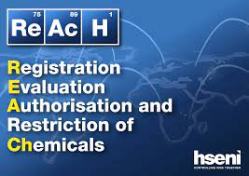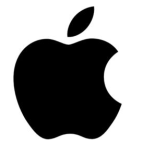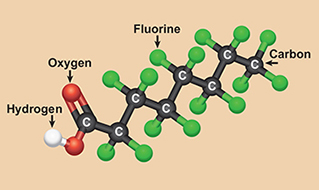In March, the EU began a public consultation on proposals to ban the whole class of up to 10,000 chemicals known as polyfluoroalkyl substances (PFAS), with a 13.5-year “transition” period for the chip industry.
Evidence is growing that fluoropolymers, the hard plastic PFAS, are toxic for humans and the environment. Read more in the US government’s National Institute of Environmental Health Sciences’ website.
PFAS – forever chemicals – are used to make critical coating materials and chemical-resistant parts for the semiconductors used in smartphones, firefighters’ suits, aircraft, electric vehicles, microchips and batteries.
Cheng Ting-Fang (right)*, award-winning tech and business journalist, who covers the global semiconductor and hardware supply chain explains in the FT:
 PFAS molecules in discarded materials do not break down easily, and instead accumulate in the environment and human organs. Scientists are increasingly concerned about severe health consequences. Studies have found PFAS in the blood of 99 per cent of Americans and unsafe levels in the drinking water and soil of both US and European citizens. The US Environmental Protection Agency has warned that even near-zero levels of PFAS could pose a threat to human health.
PFAS molecules in discarded materials do not break down easily, and instead accumulate in the environment and human organs. Scientists are increasingly concerned about severe health consequences. Studies have found PFAS in the blood of 99 per cent of Americans and unsafe levels in the drinking water and soil of both US and European citizens. The US Environmental Protection Agency has warned that even near-zero levels of PFAS could pose a threat to human health.
Members of the European Chemical Industry Council, including Bayer, Dow Europe and BASF spent €12mn in 2022 on EU lobbying, enlisting advisers to petition Brussels hoping to delay the ban or gain exemptions, according to LobbyFacts, a tool for investigating lobbying at EU institutions.
Governments should bear in mind the cost of treating PFAS-related damage to health
The Nordic Council of Ministers, European PFAS-related health costs could reach up to €84bn a year for the treatment of diseases linked to exposure such as liver damage, kidney cancer and thyroid disease (one of several articles)
 Reach is the main EU law to protect human health and the environment from the risks that chemicals can pose. EU Commissioner Sinkevicius has announced that the 2019=2o24 work on restricting all other PFAS uses is under way and the Commission will prepare the legal text for this restriction as soon as the procedure in the Chemicals Agency is completed.
Reach is the main EU law to protect human health and the environment from the risks that chemicals can pose. EU Commissioner Sinkevicius has announced that the 2019=2o24 work on restricting all other PFAS uses is under way and the Commission will prepare the legal text for this restriction as soon as the procedure in the Chemicals Agency is completed.
Martin Mulvihill is a chemist and founder of Safer Made, a ‘cleantech’ venture capital fund investing in companies and technologies that reduce people’s exposure to harmful chemicals. He believes the chemicals are overused. “We have already seen in certain sectors like food and textile that we absolutely have been able to eliminate PFAS,” Mulvihill says, “I bet we can get rid of 70-80%”.
 TSMC, Merck and Bosch told the FT that they had a long-term reduction plan to eliminate the chemicals and Intel has pledged no “new” PFAS use in its supply chain. Apple, as one of the tech industry’s biggest users of the chemicals, ranked first out of 50 companies for having the strongest safer chemicals policy, has committed to phasing them out over the long-term.
TSMC, Merck and Bosch told the FT that they had a long-term reduction plan to eliminate the chemicals and Intel has pledged no “new” PFAS use in its supply chain. Apple, as one of the tech industry’s biggest users of the chemicals, ranked first out of 50 companies for having the strongest safer chemicals policy, has committed to phasing them out over the long-term.
IBM Research Europe has three laboratories in Europe; and, with four partners: OntoChem, the University of Pittsburgh, Cornell University, and NuMat Technologies (and guidance from a PFAS Consortium). It is actively addressing the environmental and human health impact of PFAS ‘forever chemicals’ and accelerating the discovery of sustainable replacements and improved capture materials. Recently IBM was awarded a 2022 Convergence Accelerator Phase 1 award by the National Science Foundation to help to build and demonstrate these capabilities.
–
* Cheng Ting-Fang is co-winner of the Hinrich Foundation Award for Distinguished Reporting on Trade from the National Press Foundation in 2022; Best in Business SABEW Awards and has a track record of breaking news with stories related to Apple, Huawei, tsmc, Intel, Google, HP, Dell, Oppo, Xiaomi, Honor, Arm and their supply chains.
o

Leave a comment